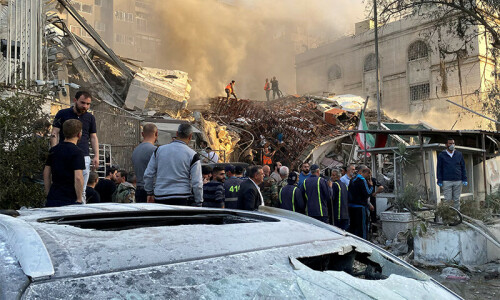• Top Iranian official warns of possible attacks on Israeli embassies
• FM Abdollahian says US missiles used to attack Damascus consulate
• IDF general, defence minister say they are ‘ready to deal’ with Iran
TEHRAN / JERUSALEM: The Middle East tinderbox saw yet another spark on Sunday, as rivals Iran and Israel directly threatened to attack each other for the first time in the six months since Tel Aviv launched its invasion of Gaza.
An adviser to Iran’s supreme leader warned that Israeli embassies are “no longer safe” after a strike in Syria, which Tehran blamed on Tel Aviv, killed seven members of the Revolutionary Guards early last week.
In response, Israeli officials have said their forces could “handle Iran”. The United States is also on high alert and preparing for a possible attack.
Tehran vowed to avenge the air strike in Damascus that levelled the Iranian embassy’s consular annex and claimed the lives of two IRGC generals, Mohammad Reza Zahedi and Mohammad Hadi Haji Rahimi.
Zahedi, 63, had held several commands during a career spanning more than 40 years.
He was the most senior Iranian soldier killed since the assassination of General Qasem Soleimani in 2020.
“The embassies of the Zionist regime are no longer safe,” said Yahya Rahim Safavi, senior adviser to Ayatollah Ali Khamenei, AFP reported on Sunday quoting the ISNA news agency.
“The resistance front is ready; how it (the response) will be, we have to wait,” Safavi said, noting that “confronting this brutal regime is a legal and legitimate right”.
He also noted that multiple Israeli embassies around the region “have been shuttered”.
Meanwhile, the semi-official ISNA news agency also published a graphic, showing weapons that it said would be capable of striking Israel Separately, Iran’s Foreign Minister Hossein Amir Abdollahian claimed on Sunday that the missiles and aircraft used to attack the consulate were US-made.
“Our consulate in Damascus was targeted using American fighters and missiles,” he said, according to Al Jazeera.
Abdollahian, who is due to arrive in Syria today (Monday), also reportedly said that the “refusal of Washington, London and Paris to condemn the consulate attack is evidence of support for the Zionist entity’s adventures and expansion of the conflict.”
Israel’s response
US President Joe Biden and Israeli Prime Minister Benjamin Netanyahu had a phone call last week, during which they reportedly discussed the threat, including what preparations could be made in anticipation of Iran’s “inevitable” retaliation.
Although Israel has not confirmed it was behind the strike on Damascus, its leaders have said in more general terms that they are operating against Iran, which they accuse of backing Hamas in Gaza and Hezbollah in Lebanon, both of which have been in combat with Israel for the past six months.
After the statement by Mr Safavi, Israeli Defence Minister Yoav Gallant’s office said he held an “operational situation assessment” with senior military officers.
“Upon completing the assessment, Minister Gallant emphasized that the defense establishment has completed preparations for responses in the event of any scenario that may develop vis–vis Iran,” his office said.
Later, the Israeli military chief also said they could handle any Iranian threat.
“The IDF can handle Iran,” Chief of General Staff Herzi Halevi said in a televised statement. “We can act forcefully against Iran in places near and far. We are cooperating with the United States and with strategic partners in the region,” said Halevi.
Iran’s options
Writing in The National, Beirut Institute chairwoman Raghida Dergham noted: “Iran doesn’t want a full-scale war but aims to show Israel the risk of a costly conflict.”
“One likely decision by Tehran is to increase support for the Houthis, encouraging them to escalate Red Sea attacks to disrupt international navigation,” she wrote.
Tehran could also “consider shooting down Israeli aircraft in Syrian airspace… [while] another option is a targeted attack on the port of Haifa, aiming to destroy its infrastructure,” she noted.
Published in Dawn, April 8th, 2024














































Dear visitor, the comments section is undergoing an overhaul and will return soon.